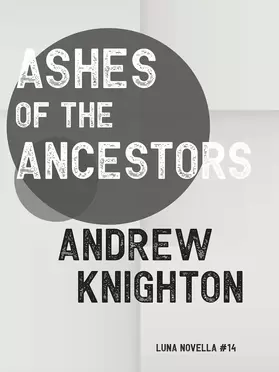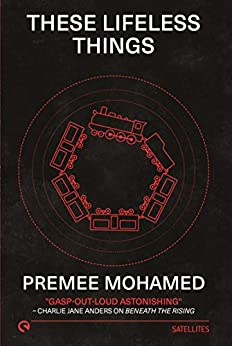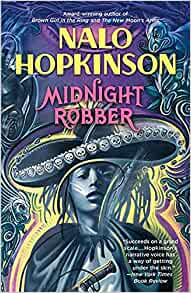|
Andrew Knighton, Ashes of the Ancestors, Luna Press Publishing, 2023. Ashes of the Ancestors is a novella that begins as a deceptive cosy fantasy with a great world building and turns into a very topical story that makes it a must-read. Magdalisa is the last one working in the monastery. She takes care of the ashes that the spirits of the illustrious dead of the Empire use to take form and guide people who come seeking their advice. She's devoted to those spirits who have replaced the family she lost, and she admires their wisdom and the tradition she upholds. But the world is changing: the land crubles under their feet, the empire is only a shadow of its former glory. Then someone else arrives to work with her. Ashes of the Ancestors begins by following Magdalisa in her routine, and the 1st person narrative lets you access her inner thoughts, in particular how much life in the monastery gives her structure and meaning, how important the dead are to her. At first, you feel a lot of pity and empathy for her, but as we see her unbending obedience to tradition, emotions towards her shift. It's done in a very subtle and effective way and you find yourself thinking by mid-point that, actually, you aren't sure you like her that much. Magdalisa's development comes in the form of new arrivals to the monastery. She who spent so much time among the dead is now confronted to the living: Adrana and her thirst for change, Olweth and her cooking talents, but also the ruthless Duke Lorkas. Adrana is also a very interesting character, showing nuance and determination. The gallery of the dead is well done and each of them have a real personality. They offer a striking picture of this society, its values, its faults and its hopes. Ashes of the Ancestors took me by surprise. It starts like a cosy fantasy and it was the world building that hooked me, more than the character. I loved the atmosphere of the monastery and the concept of those illustrious dead you call to give you guidance. But this is precisely where Knighton was heading. He tells us the story of an Empire so obsessed with its glorious past that it cannot admit its current state and accept the new challenges the world faces. It refuses to acknowledge that its "glory" was in fact death, conquest, and dispossession for many. As I said, it's very topical! The issues of traditions, hierarchies and of illustrious dead people we erect as icons are bared unflinchlingly and, of course, lead to the question: is it better to burn it all to the ground or to use the past as a beacon? Knighton's prose is highly readable. It gives you a straightforward access to the action and thoughts. In a few brushstrokes, he gives us a very definite atmosphere of the setting, full of smoke and ashes, stone and dungeons. The prose apparent simplicity conveys efficiently the complexity of the world building and of the inner conflicts the characters face in a striking location. I nonetheless regret that the last inner conflict leading to the resolution felt a bit abrupt to me. I suppose the length constraints of the novella are to blame. A pity though, all the more because I feel there's a world there that could be further explored and we only get tantalising hints of it. Fantasy is often said to be a perfect metaphor to speak about our societies. Ashes of the Ancestors does it in a remarkable way, with a world that is very much its own and characters we could all recognise. Knighton has written a perfect story for our times and it'd be a pity to miss this mirror he holds up to us in such a successful manner. Disclaimer: a free copy was received but with no obligation attached to review it. If you've liked Ashes of the Ancestors, you may also like
Comments are closed.
|
All reviews are spoiler free unless explicitly stated otherwise.
I only review stories I have liked even if my opinion may be nuanced. It doesn't apply for the "Novels published before 1978" series of blog posts. Comments are closed, having neither time nor the inclination to moderate them. |
WHAT IS THE MIDDLE SHELF?
The middle shelf is a science-fiction and fantasy books reviewS blog, bringing you diverse and great stories .
PLEASE SUPPORT AUTHORS.
IF YOU LIKE IT, BUY IT. |
ON THE MIDDLE SHELF
|
KEEP IN TOUCH WITH THE MIDDLE SHELF
|







 RSS Feed
RSS Feed
